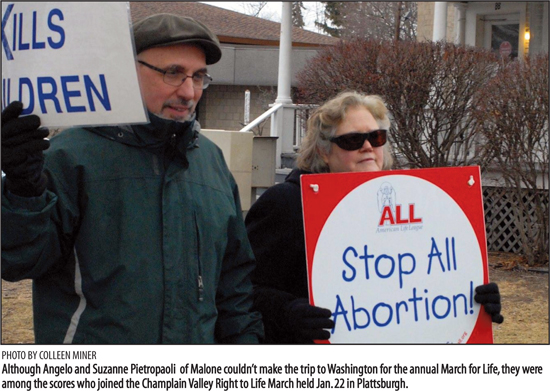Feb. 1, 2017 By Suzanne Pietropaoli Recently an acquaintance asked my husband and me if we would be attending the annual March for Life in Washington D.C. on January Regrettably, we have aged out of that grueling trip, when we would drive to Plattsburgh to board a bus at 8 p.m. and travel through the night to arrive in the Capitol Hill neighborhood at 6 a.m. the next morning. A day of prayer, rallies, and speeches was capped by the march: that sea of people overflowing Constitution Avenue from the Washington Monument to the Supreme Court. Then it was back to the buses once more for the return trip. Though we can no longer manage this 48-hour marathon, we are very grateful to the hundreds of thousands of people (including friends and family members) whose presence there affirms that all human life is precious. After all, “inconvenient,” “imperfect,” “unwanted” are labels attached to the unborn by others. But labels cannot change the reality that a human person, no matter how small, as Dr. Seuss famously wrote, is still a person: unique, beautiful, full of promise. Each is a being whose potential will need a lifetime in which to be fully realized; each is a unique and irreplaceable gift that would only keep on giving as the years pass. But of course, not all babies will have that opportunity. In fact, as of this writing, 59,725,176 babies have been lost in this country to abortion since it was legalized January 22, 1973. To get a sense of just how many missing persons that is, consider the states of New Jersey, Virginia, Illinois, Pennsylvania, Maryland, Massachusetts, Maine, New Hampshire, and Vermont. Now imagine them empty, entirely devoid of their current populations. How could we ever think that such catastrophic losses would not have catastrophic consequences? That emptiness has effects that reverberate throughout our social and economic systems. At the personal level, each one of those lost babies was someone’s child and grandchild, and very likely would have been another person’s sister, brother, friend, spouse. In time, those lost children would have had children and grandchildren of their own. Now that will never be; certain future generations will simply never exist. Family relationships have been disrupted, and any family that has lost a child to illness or injury knows all too well the hidden hole left by such tragedy. Then there is the broader social impact. Who were these children? Who might they have become? What might they have done? Given such staggering numbers, it is certainly reasonable to think that the arts, medicine, education, science, business—and neighborhoods!—would have been enriched and strengthened by the presence and the gifts of so many millions of people. We cannot begin to know exactly what we have lost, but that does not lessen the effect. Ironically, it may be easier to gauge the economic impact. In the immediate, babies not allowed to be born will never be consumers, a serious issue in an economy built on consumerism. Imagine the billions of dollars in economic activity that would have been generated over their lifetimes: from diapers, formula, and baby furniture; to sneakers, computers, and iPhone; to cars, college educations and new homes. Imagine, too, the financial contribution of nearly 60 million additional taxpayers! One of the most significant shifts of all is in the way we see and respond to the weak and vulnerable. Almost 2500 years ago, the Greek philosopher Aristotle reminded humanity that we become what we repeatedly do. Forty-four years of abortion on demand have sent the message that people who displease us in some way, or who somehow fail to measure up, can be removed by whatever means we deem necessary. Skyrocketing suicide rates, widespread violence, and the steady march of euthanasia reflect a lesson well-learned—that not all life is worth living, that only some lives are worth protecting. So yes, thanks to those who march, and to everyone everywhere who honors the gift of life in all its fragile beauty. There is a line in the sand here: on one side, life as an incomparable gift, and on the other, life as an intolerable burden. Mending the tears in our social fabric may well depend on finding our way back to reverencing the human person, the very crown of all creation. After all, as poet Carl Sandburg said so well, “A baby is God’s opinion that life should go on.” |
||||

 27th. This year marks the 44th time that hundreds of thousands of women, men, and children from across the country will board buses and travel to the nation’s capital where they will witness to the value of every single human life.
27th. This year marks the 44th time that hundreds of thousands of women, men, and children from across the country will board buses and travel to the nation’s capital where they will witness to the value of every single human life.